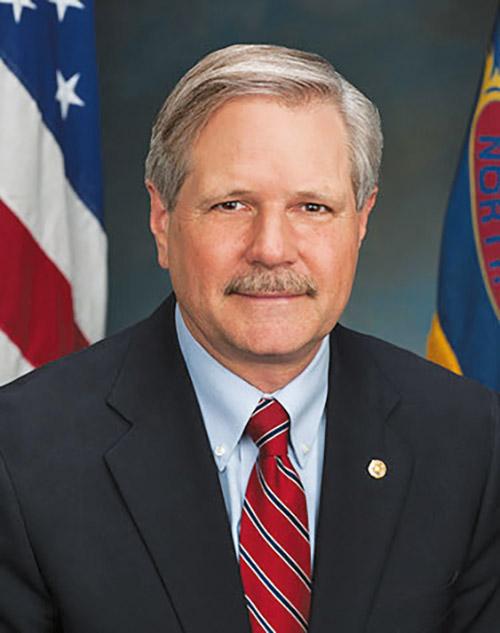


The announcement in early November by the Orthodox Union Advocacy Center of the passage of the Nonprofit Energy Efficiency Act in the U.S. Senate and House of Representatives, and signing of the overall infrastructure bill by President Joe Biden, prompted The Jewish Link to explore how the Advocacy Center got this long-sought effort over the finish line. The backstory of that success involves perseverance, partnerships and bipartisanship.
The Success
The Nonprofit Energy Efficiency Act establishes a $50 million pilot program, to be managed by the U.S. Department of Energy, for houses of worship (such as shuls), parochial schools (such as yeshivot and day schools) and other nonprofits (such as Jewish Federations and JCCs) to upgrade the energy efficiency of their buildings. The NEEA pilot program will offer grants to nonprofits for facility improvements that reduce energy usage and increase energy efficiency; qualifying projects may include replacing an aging radiator or legacy heating/cooling system, purchasing an updated HVAC system, securing solar panels or other efforts.
Despite the wisdom of the oft-cited maxim, “Success has many fathers but failure is an orphan,” many sources have correctly credited the OU Advocacy Center with spearheading this victory. As one example, in a press release issued on November 11, Agudath Israel wrote: “‘Agudath Israel was pleased to voice its support for this legislation and we look forward to the potential benefits that will accrue to the community,’ said Rabbi Abba Cohen, Agudath Israel’s Vice President of Government Affairs and Washington Director … ‘we applaud the Orthodox Union for the vital role it played in seeing the legislation through over the past decade.’”
Similarly favorable coverage, recognizing the OU Advocacy Center’s leadership, has appeared in Jewish Insider, The Jewish Telegraph Agency, Haaretz, The Times of Israel, The Jerusalem Post, the 5 Towns Jewish Times, The Hill and several other publications.
Perseverance
The OU Advocacy Center first enlisted two senators as co-sponsors for the bill in 2011. The measure previously was introduced in the U.S. Senate in 2013, 2015 and 2019. Twice, the bill passed the Senate and stalled in the House of Representatives. Finally, on the fourth try, it passed in both chambers this year as part of the larger federal infrastructure package.
When a bill fails to pass both chambers in a one-year term of Congress, it must be reintroduced in another term. This means that the OU Advocacy Center managed to persuade the two co-sponsors to reintroduce the bill three times before it finally passed. When asked how they accomplished this, Advocacy Center Executive Director Nathan Diament told the Jewish Link: “When you have a good working relationship with the sponsors, it’s not that hard.” He also pointed out that it’s not that unusual in Washington for senators to reintroduce bills: “It can take a long time to get certain things done, due to politics and the machinations in Washington. You need to have patience and the type of partners who are dedicated to the cause.”
Partnerships
One notable feature of this multi-year effort is the broad and diverse coalition that the Advocacy Center enlisted to help encourage elected officials to support the bill. The coalition included the Jewish Federations of North America, the National Association of Evangelicals, the National Council of Churches, the National Council of Nonprofits, Independent Sector, the Evangelical Lutheran Church in America, YMCA Association, the Association of American Museum Directors, the Salvation Army, the U.S. Conference of Catholic Bishops and others. Diament explained the vital importance of enlisting a big team of groups in support of a bill: “For the Orthodox Jewish community, which is relatively small, we can only get big things done by working in coalition with others. It’s all about relationships. We’ve worked with all these partners in the past on different things and we’ve developed deep bonds … we’ve been doing this a long time.” Diament has been leading the Advocacy Center for 25 years.
Bipartisanship
Another key aspect of the bill that helped it garner broad support was the Advocacy Center’s enlistment of respected legislators from both parties—Senator Amy Klobuchar (D-MN) and Senator John Hoeven (R-ND)—as the co-sponsors. At a time when some grassroots leaders are urging the Jewish community to abandon support of one political party or another, the Advocacy Center’s successful efforts to build bipartisan support for the energy bill are all the more remarkable. Diament stated, “If you want to actually get things done, and not just make noise, in a closely divided Washington, DC, landscape, bipartisanship is essential.”
Diament said that the Advocacy Center had gotten to know Senator Hoeven from his time as chair of the Senate Subcommittee on Homeland Security. Even though his state has a very small Jewish presence, he understands the challenges facing the community. Before enlisting Senator Klobuchar as cosponsor, the Advocacy Center learned about the moderate centrist Democrat and her reputation as someone who gets things done, often in a bipartisan manner.
Next Steps
Over the next few months, the U.S. Department of Energy will be preparing the guidelines and application process for the grants to be allocated under the Nonprofit Energy Efficiency Act. Jewish community leaders can register with the OU Advocacy Center to receive updates on the implementation of the program at https://advocacy.ou.org/energygrants/.










